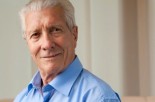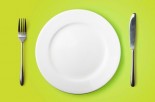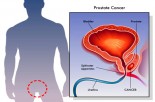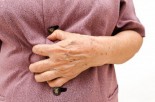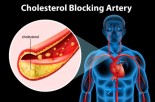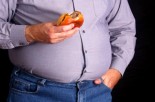Monday, 04 November 2013 21:42
Frustrations of a Celiac
Why is it that more places are offering gluten-free foods, but are recommending that people with Celiac Disease shouldn't eat there?
Doesn't that defeat the purpose?
It's been two years since my diagnoses of Celiac Disease. At first, I would overdramatize how much my life was ruined and that food would no longer mean the same. I recently became excited to hear of all the great options that were open to me. Little did I know, what restaurants really meant was their gluten free option is only for those who are going through yet another diet fad, not those who truly need it.
I've always had digestive problems, but thought it was just stress, or IBS. It seemed normal to me (and I as I type this I realize how this sounds) to throw up, have diarrhea, and get horrible abdominal pains, and constantly feel bloated immediately after eating.
I had just transferred to DePaul University in the fall of 2011, and was just getting used to living back on a college campus again. This was when I began noticing more and more issues with my gut. However, I ignored these symptoms and just thought I was stressed from school, as I tend to be during the quick ten-week quarter system DePaul has.
A few nights a week I would be up all night, death gripping the sides of my toilet while everything poured out of my mouth. My roommates would joke with me and say, "You're sick all the time. Maybe you have the gluten thing." Laughing, thinking that was not even possible, I ignored them and continued doing absolutely nothing about addressing the problem.
As time progressed, it started to become a hassle to eat. After every meal I would feel exhausted from throwing up, from the horrible pains I felt and all I wanted to do was lay down. Date nights I had with my boyfriend turned embarrassing, for I would need to quickly excuse myself to spend what seemed an eternity in the ladies room.
Published in
RadioMD Blog
Thursday, 31 October 2013 23:00
Estrogen Dominance: Too Much of a Good Thing Can Be BAD
When there is an excess of any hormone in relation to the whole intricate system we call the"endocrine system", an overall imbalance develops, and health problems can arise. When there is too much estrogen and not enough progesterone to counteract its effects, the situation is called estrogen dominance.
Estrogen dominance is a multi-factorial situation and is caused by such things as exposure to excess environmental xenoestrogens, use of synthetic estrogens such as the birth control pill and hormone replacement therapy (HRT), anovulation (lack of ovulation during menstrual cycle, which is not uncommon among women older than 35), digestion issues (which tax the estrogen-detoxification process in the liver), unrelenting stress (which strains the adrenals and the thyroid), unresolved emotional issues, poor diet and negative lifestyle factors such as smoking and alcohol use.
How does estrogen dominance specifically alter women's health?
Estrogen dominance is a multi-factorial situation and is caused by such things as exposure to excess environmental xenoestrogens, use of synthetic estrogens such as the birth control pill and hormone replacement therapy (HRT), anovulation (lack of ovulation during menstrual cycle, which is not uncommon among women older than 35), digestion issues (which tax the estrogen-detoxification process in the liver), unrelenting stress (which strains the adrenals and the thyroid), unresolved emotional issues, poor diet and negative lifestyle factors such as smoking and alcohol use.
How does estrogen dominance specifically alter women's health?
Published in
RadioMD Blog
Wednesday, 30 October 2013 14:33
Low Testosterone: Effective Treatment Options
Low testosterone is associated with depression, high blood pressure, high cholesterol, diabetes and erectile dysfunction.
Published in
Mindful Medicine
Friday, 25 October 2013 14:01
Advances in Prostate Cancer Treatments
For most men diagnosed with prostate cancer, there are many treatment options. How do you decide which one is best for you?.
Published in
Managing Cancer
Thursday, 10 October 2013 14:45
Nitric Oxide: Lesser Known Heart Disease Risk
Published in
Healthy Talk w/ Dr. Michael Smith
Thursday, 10 October 2013 14:22
Can Cinnamon Prevent Alzheimer's Disease?
Published in
Healthy Talk w/ Dr. Michael Smith
Thursday, 10 October 2013 14:00
Dichloroacetate: A Cure for Cancer?
A powerful anticancer drug, dichloroacetate, induces cancer cell death. The problem? It's too cheap for Big Pharma.
Published in
Healthy Talk w/ Dr. Michael Smith
Wednesday, 18 September 2013 14:22
Reduce Urinary Frequency Effectively & Naturally
Published in
Mindful Medicine
Wednesday, 18 September 2013 11:11
Gentlemen: Want to Reboot Your Competitive Drive?
Men, have you lost your competitive drive as you've grown older? Learn how to reboot that drive, naturally.
Published in
Naturally Savvy
Thursday, 29 August 2013 14:45
Does Surgery Increase the Risk of Cancer Spread?
Even though it contradicts conventional thinking, the facts are undeniable: cancer surgery can increase the risk of metastasis.
Published in
Healthy Talk w/ Dr. Michael Smith
Thursday, 29 August 2013 14:00
Intermittent Fasting Extends Lifespan
Intermittent fasting has been practiced for centuries but is now making a pretty big comeback. Why? Because, research shows it can add years to your life.
Published in
Healthy Talk w/ Dr. Michael Smith
Tuesday, 27 August 2013 20:55
Friends Don't Let Friends Get Fat?
It happens to the best of us. You maintain a strict habit of exercise and dieting throughout the week. You're disciplined. You're organized. You've got this. Then the weekend approaches and it’s time for date night, or the much-needed opportunity to catch up and hang out with your friends. You, believing you are being a good healthy-eating planner, check out the restaurant's menu online beforehand to pick out a reasonably healthy meal and drill this motivational speech into your head:
"I will not overindulge tonight."
And this time, you're serious.
That is, until you hear what your friends are ordering. And before you know it you’re ordering a side of French fries AND a slice of cake to go.
What just happened?
Published in
RadioMD Blog
Wednesday, 21 August 2013 11:22
Are You on the Yoga Bandwagon? You Should Be
Published in
Naturally Savvy
Thursday, 15 August 2013 14:33
What is Longboard Therapy?
Longboard “skating” therapy is a solution-focused approach to helping people overcome difficult life challenges.
Published in
Healthy Talk w/ Dr. Michael Smith
Thursday, 15 August 2013 14:22
Innovations in Prostate Cancer Treatment
High intensity focused ultrasound (HIFU) and cryotherapy are exciting new treatment options for prostate cancer.
Published in
Healthy Talk w/ Dr. Michael Smith
Thursday, 15 August 2013 14:11
New Diagnostic Tests for Prostate Cancer
Doctors who rely solely on PSA testing are initiating aggressive prostate cancer treatments just to be safe. But it is often unnecessary.
Published in
Healthy Talk w/ Dr. Michael Smith
Wednesday, 14 August 2013 11:22
Yoga for the Mind, Body & Soul
Yoga can be healing for your mind, body and heart. Discover how you can incorporate yoga into your life... anywhere, anytime.
Published in
Naturally Savvy
Monday, 29 July 2013 12:33
The Miracle Drug for Autoimmune Diseases
There's a new drug that effectively treats autoimmune diseases such as MS, lupus, rheumatoid arthritis, fibromyalgia and Crohn's.
Published in
Staying Well
Monday, 15 July 2013 12:11
Do Men Have a Harder Time Communicating?
Communication is the foundation on building a relationship. But communication also seems to be the biggest struggle between couples.
Published in
Staying Well
Monday, 01 July 2013 20:52
The 250:250 Weight Loss Rule
I did a search on Google for weight loss, weight loss supplements and weight loss nutrients. You can only imagine how many web pages and products Google found. We’re talking millions of web pages and thousands of product pages. No kidding.
But here are my questions. Have we overly complicated weight loss and do we really need thousands of “miracle” fat burners? Well, I think we have complicated it too much and I don’t think we need thousands of products. Let me explain.
Published in
RadioMD Blog
Monday, 17 June 2013 13:34
Heart Disease Risk Factors Your Doctor Won't Tell You About
Modifying traditional heart disease risk factors is not enough to protect your heart. Many Americans continue to suffer from heart attacks and stroke despite receiving a clean bill of health from their doctors. So what are we missing?
Traditional medicine modifies just 6 risk factors — obesity, smoking, high LDL-cholesterol, low HDL-cholesterol, high triglycerides, and high blood sugar. However, integrative and alternative doctors have come to recognize 11 additional risk factors.
Here are two additional risk factors to consider if you want to keep your heart healthy …
Published in
RadioMD Blog
Thursday, 13 June 2013 14:45
Are Your Arteries Turning into Bone?
In diseased arteries, bone-making cells can be found in the lining of arterial walls. And, as you can probably imagine, this is not a healthy process.
Published in
Healthy Talk w/ Dr. Michael Smith
Wednesday, 12 June 2013 11:22
30-Day Plan for Lasting Weight Loss & Total Health
Published in
Naturally Savvy
Monday, 10 June 2013 12:11
More Women Dying from Abdominal Aortic Aneurysms
Each year more than 200,000 Americans get an abdominal aortic aneurysm, which can cause massive internal bleeding and death.
Published in
Staying Well
Wednesday, 29 May 2013 23:40
Red Cabbage is Good for Bad Nerves
Diabetic neuropathy results from two destructive processes caused by high blood sugar: oxidative stress and glycation. Here at Life Extension® we are always looking for innovative ways to help fight against the damaging effects of high blood sugar.
The latest discovery is found in almost every grocery store in the nation … red cabbage. Researchers at the United Arab Emirates University studied red cabbage extract’s protective action against oxidative stress. Their results are quite amazing.1
Diabetes was induced in male rats using a common laboratory technique (infusion of the chemical streptozotocin). Within 60 days, all of the rats infused with streptozotocin exhibited many symptoms of diabetes including loss of body weight, high blood sugar, kidney problems and nerve cell dysfunction.
The latest discovery is found in almost every grocery store in the nation … red cabbage. Researchers at the United Arab Emirates University studied red cabbage extract’s protective action against oxidative stress. Their results are quite amazing.1
Diabetes was induced in male rats using a common laboratory technique (infusion of the chemical streptozotocin). Within 60 days, all of the rats infused with streptozotocin exhibited many symptoms of diabetes including loss of body weight, high blood sugar, kidney problems and nerve cell dysfunction.
Published in
RadioMD Blog
Thursday, 23 May 2013 14:33
The Lesser-Known Heart Disease Risk Factors
Statin drugs have failed to eradicate heart disease. Why? Because lowering cholesterol is only one of several risk factors.
Published in
Healthy Talk w/ Dr. Michael Smith
Thursday, 23 May 2013 14:22
Natural Ways to Safely Lower Your Cholesterol
Treating high cholesterol and lowering your risk of heart disease is very possible with diet, exercise and supplements.
Published in
Healthy Talk w/ Dr. Michael Smith
Thursday, 23 May 2013 14:11
Statin Drugs: Miraculous or Misguided?
Published in
Healthy Talk w/ Dr. Michael Smith
Wednesday, 22 May 2013 15:39
The Health Benefits of Walnuts: A True 'Super Food'
The Greeks called the walnut “the nut of Jupiter,” fit for the gods. Native to Persia, walnuts now come from California, which has over 122,000 acres of walnut trees. The tree itself is very hardy and is 15 years old before reaching full production. The average tree produces for 45 years.
Walnuts are high in unsaturated, fatty acids, iron, and B vitamins. The oil in walnuts has a tendency to absorb strong odors, so they should be kept in cold storage. Manufacturers of syrup toppings, ice cream, candy, casseroles and baking products all rely on walnuts.
Although many nuts have proven to be really beneficial to your health, studies are showing that walnuts contain almost twice as many antioxidants as other nuts. And that’s not just an interesting statistic — all of those antioxidants really do your body a lot of good. Below, we’ll take a look at two big stand-out benefits of walnuts.
Walnuts are high in unsaturated, fatty acids, iron, and B vitamins. The oil in walnuts has a tendency to absorb strong odors, so they should be kept in cold storage. Manufacturers of syrup toppings, ice cream, candy, casseroles and baking products all rely on walnuts.
Although many nuts have proven to be really beneficial to your health, studies are showing that walnuts contain almost twice as many antioxidants as other nuts. And that’s not just an interesting statistic — all of those antioxidants really do your body a lot of good. Below, we’ll take a look at two big stand-out benefits of walnuts.
Published in
RadioMD Blog
Tuesday, 21 May 2013 12:11
Fit & Healthy Father's Day Gift Ideas
Want to give a Father's Day gift that keeps on giving... and that your pop will actually use? Look no further!
Published in
Train Your Body
Friday, 10 May 2013 10:22
Have You Checked Your Blood Pressure Lately?
Published in
The Dr. Leigh Vinocur Show
Friday, 10 May 2013 10:11
The 411 on Preventing Stroke
How can you prevent a future stroke? Learn important steps to take to protect yourself and your loved ones.
Published in
The Dr. Leigh Vinocur Show
Friday, 10 May 2013 10:00
Learn Your Stroke Factors
Published in
The Dr. Leigh Vinocur Show
Tuesday, 23 April 2013 12:00
Will Clean Eating Eliminate Belly Fat?
What is clean eating? Is it a passing fad or truly the best way to eat? Try these tips to eliminate stubborn belly fat.
Published in
Train Your Body
Monday, 22 April 2013 22:08
Don’t Get Stuck Using a Nonstick Pan!
I think I was born to be a Naturopathic Doctor.
Even at a young age, I was putting on my thinking cap and truly trying to “think things through”. You see, for a period of my childhood I was totally “into” having a parakeet as a pet. I would name them all names starting with “B” like, Bert the bird or Ben the Bird.
The reason I had more than one (bird’s tend to live a long time) is because they kept dying. Every few months, I was dealing with a dead bird. I was devastated when I would come home from school and my bird was lying lifeless at the bottom of its cage.
The devastation inspired my curiosity as to what the heck was happening. I started thinking about where the birds lived, what was the environment like? The bird cage (I would never cage an animal again, by the way) hung near the kitchen so I started to wonder what they might have been breathing that contributed to their demise. My inquisitive mind popped out the answer one day when my Mom was making dinner and smoke was filling the kitchen. I asked her what kind of pans she was using to cook in. She stated proudly, “Non-stick Teflon. Easy clean up, they are the best!”
Well, they weren’t the best for my birds and they are NOT the best for us either. STOP USING THEM!! (Please.)
Published in
RadioMD Blog
Monday, 22 April 2013 12:33
Brian Cuban Shares His Eating Disorder Struggle
Are male eating disorders a silent epidemic? Many men, including Mark Cuban's brother, suffer. Research says he is not alone.
Published in
Staying Well
Tuesday, 16 April 2013 12:11
Should You Choose a Personal Trainer Based on Looks?
Does the way your trainer looks affect your impression of them? Or vice versa? Find out the best criteria for YOU.
Published in
Train Your Body
Tuesday, 12 February 2013 00:08
Getting to the HEART of the Matter
Life. Seriously, what would we do without it?
From the moment it begins to the moment it stops, life itself is supported by one of the most fascinating structures in the human body, the heart.
Based on an average lifespan of 75 years and an average heartbeat of 72 beats per minute, the average heart, that big muscle in the middle of the chest, beats around 2,838,240,000 without ever taking a rest. Tirelessly pumping the energy we need to sustain life.
What an amazing organ!
That is why the fact that heart disease is the number one killer of both men and women in the United States shakes me to the core as a practitioner. Why is this the case?
After all, we are one of the most scientifically advanced, educated and economically savvy countries in the world. We have Rhodes scholars and Noble Prize winning scientists and researchers conducting studies and drafting pieces of literature about health, disease, medicine, you name it.
But we continue to have a staggering number of individuals affected by a diseased heart. According to the CDC (Center for Disease Control & Prevention) in 2008, 631,636 people died of heart disease - that is 26% of all deaths; more than one in every four. Every year about 785,000 Americans have a first heart attack. Another 470,000 who have already had one or more heart attacks, have another.
This isn't just a tragedy of life and loss, this burden we bear as a nation also carries an extremely steep financial price. It is predicted that for 2010, heart disease will have cost the United States $316.4 billion. This total includes the cost of health care services, medications and lost productivity.
Being a Naturopathic Doctor, I am fueled to think about troubling situations like this in a very comprehensive manner.
Published in
RadioMD Blog
Thursday, 07 February 2013 23:00
Genetics Load The Gun, Lifestyle Pulls the Trigger
Is this a shameless gun analogy, or am I trying to make a point?
Actually, it is a little of both.
Mort, Matt, and Seth.
Mort is a 78-year-old male who was brought in by his son Matt who was 58, and Matt's son Seth who was 35 years old.
Two years ago Mort had his fifth stent implanted into his coronary arteries to help repair the two bypass surgeries, which had failed over time to keep blood pumping into the heart muscle. Mort was told by his previous cardiologist that he was lucky to have a technology, which could "buy him a few more years", because he just had bad genetics.
Matt, Mort's son, had already had a heart attack at 45 with a nice little Mort starter kit of three stents. He felt that bypass was inevitable in the next few years. Seth joked with me that he was looking at his future, but uneasily.
Combined, Mort and Matt where on 14 medications. The cardiologist wanted to start Seth on cholesterol lowering medications even though he was without symptoms and still a young man.
Published in
RadioMD Blog



